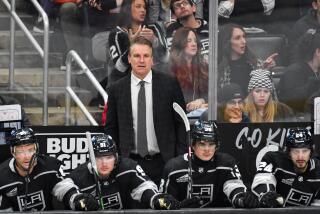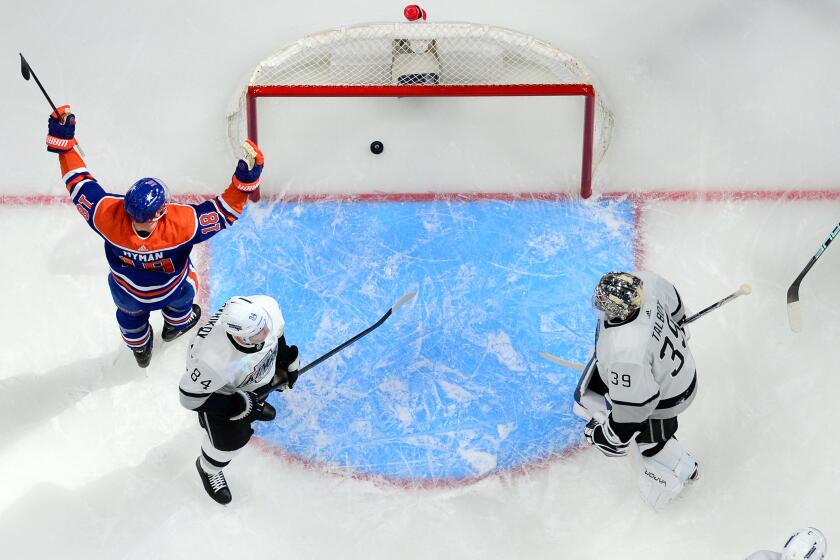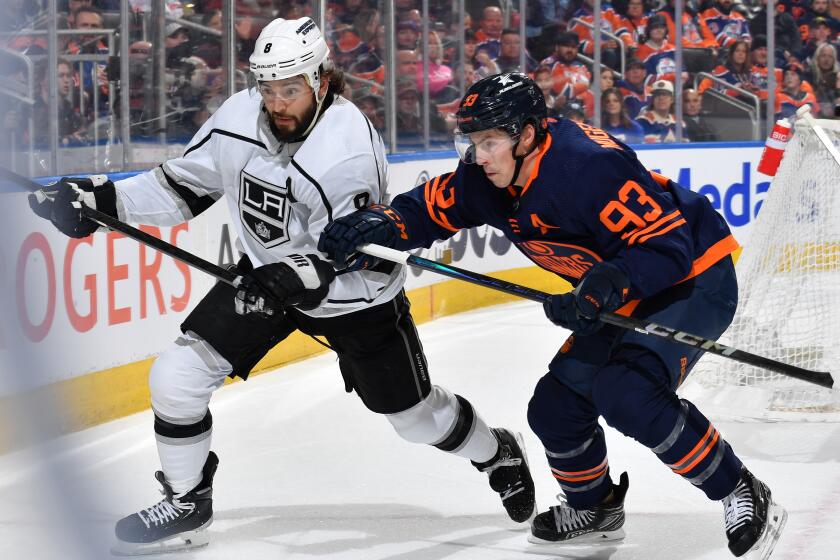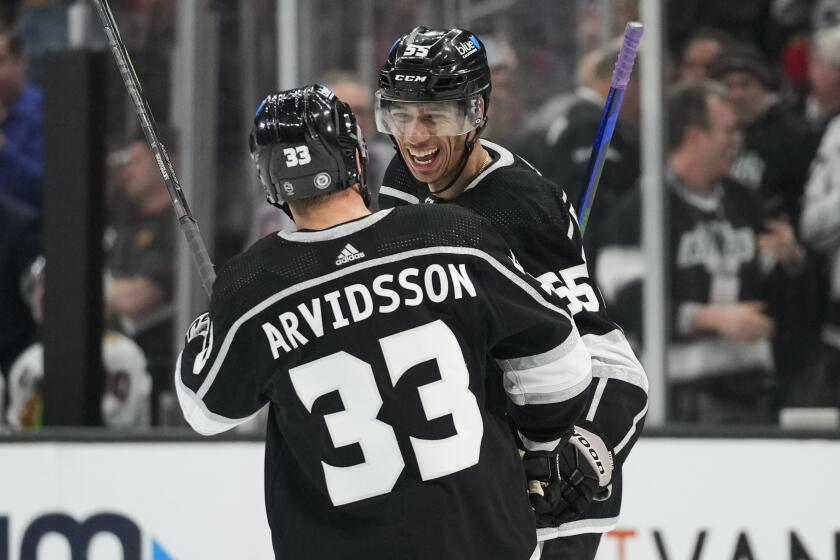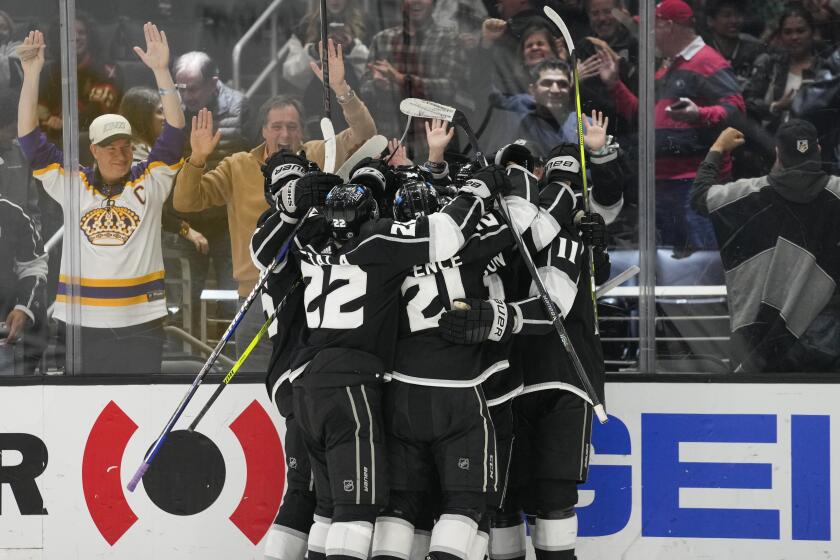They Never Had a King’s Ransom
Jerry Buss couldn’t do it. Bruce McNall couldn’t either, and he’s sure Jack Kent Cooke failed, too. Joe Cohen and Jeffrey Sudikoff certainly didn’t: they plunged the Kings into bankruptcy.
No King owner has had a profitable season, but that streak may soon end. Tim Leiweke, chief executive of AEG, has projected that the Kings will make money if they play one playoff round, thanks largely to the new collective bargaining agreement they sought after calculating they’d lost $125 million in 10 years under owners Philip Anschutz and Ed Roski.
“Not a lot of money, but yes, and for the first time,” Leiweke said while watching a King game in his Staples Center suite.
Just to be sure, he shouted above the din to McNall, who was digging into the spread.
“Hey, Bruce, did you ever make money running the Kings?” Leiweke said.
McNall -- who bought a 25% interest in the club from Buss in 1986, upped his stake to 49% in 1986 and bought the rest late in the 1987-88 season -- said he hadn’t made money. To his knowledge, nor had Cooke, who bought the franchise in 1966 but didn’t see crowds exceed an average of 10,000 until 1972-73.
“So I believe,” Leiweke said, “the answer to this is, this would be the first year the Kings ever made money in our history.”
McNall, who has claimed he made $2 million in 1992-93, said Leiweke’s assertion was “absolutely accurate.”
McNall added, “I may have, by the way, said we made a few dollars from time to time. There were some reports we made some money but they were inaccurate. We did get close to breaking even but salaries got bigger and bigger.”
Bob Steiner, a spokesman for Buss, confirmed that the Kings never made money under Buss’ ownership. Buss bought the Kings and Lakers from Cooke in 1979. “He wants to extend his congratulations to Tim,” Steiner said.
Leiweke credited NHL Commissioner Gary Bettman for negotiating an economic system that includes a $39-million salary cap and links payrolls to league revenues.
“He’s given us a chance to make it work now,” Leiweke said.
Leiweke said in July the Kings had been preparing for this system for five years, and their planning appears to have paid off: They Lead the Pacific Division and have the third-highest point total in the NHL with a payroll that sits between $32 million and $33 million and gives them room to maneuver.
Shedding expensive contracts before the lockout gave them room to sign free agents Craig Conroy and Pavol Demitra and take on Jeremy Roenick’s salary in a trade. Their development system has produced standouts Lubomir Visnovsky, Michael Cammalleri, Dustin Brown, Alexander Frolov and Tim Gleason; General Manager Dave Taylor filled in gaps by trading for goalies Mathieu Garon and Jason LaBarbera.
“We have not only depth, but every night it seems another guy steps up. We spread the load out more than relying on just one guy or two guys,” Leiweke said.
“I don’t think anybody’s giddy, but at the same time we knew that we had told people we saw the new collective bargaining agreement as an opportunity for us to be competitive, and it’s nice that at least after the first two months of the season, we’ve proven that to be truthful.”
Union Lacks Unity
Saying the NHL Players’ Assn. had “taken a giant step backwards” and was a “tattered union,” Steve Larmer resigned as its head of player relations.
Larmer said the NHLPA’s executive committee ignored the union’s constitution by not letting the full board vote before it gave Ted Saskin a six-year, $12-million contract to replace Bob Goodenow, who resigned in July. Larmer drew a parallel to the reign of Alan Eagleson, who served six months in jail for racketeering and defrauding players of pension money and insurance payments.
Larmer echoed criticisms made by about 30 players who filed a complaint with the National Labor Relations Board in September alleging Saskin had been hired illegally.
On Monday, the NLRB heard the complaint but did not issue a ruling. Robert Lanza, the lawyer representing the dissident players group, told the Canadian Press on Monday evening: “I really can’t talk about it other than to say there had been speculation that it would be dismissed [by the NLRB] but it was not.”
Trent Klatt, a former King and former member of the NHLPA negotiating committee, heads the dissident group.
“What has taken place since Bob was let go is unacceptable,” Larmer said in a letter posted on the TSN website. “No matter how you look at it, it shows a total disregard for all of the players.... I was around during the Eagleson days and this reminds me of how ‘Eagle’ operated.”
Saskin said via e-mail he considered Larmer’s resignation “very unfortunate since he has not received accurate information on recent events and has never discussed any of his concerns with me or other executive committee members.... And while I don’t agree with his stated reasons for his resignation, I certainly respect his right to do so.”
NHLPA President Trevor Linden, who was instrumental in hiring Saskin, said he had little to say about Larmer “other than I don’t agree with his assessment. I wish he would have spoken to us before he released that. He’s certainly a guy I enjoyed working with, and it’s an unfortunate situation.”
Slap Shots
Pittsburgh goalie Marc-Andre Fleury stopped 45 shots in a 3-2 victory over Philadelphia on Wednesday only to be assigned to Scranton of the American Hockey League the next day.
The reason was financial, not personal: Every day he spends on the Penguin roster counts against their salary cap, but his AHL time doesn’t. Many teams are shuffling players up and down to save money, even though youngsters lose the benefits of practicing with NHL players and learning the club’s system.
The addition of Martin Brodeur to the NHL’s competition committee last week corrected a glaring oversight committed when goalies were given no say about rule changes that reduced the size of goalies’ equipment and limited the area in which they can handle the puck.
They’ve largely adjusted to the smaller pads and gloves but remain upset about forwards barreling into them. Former goalie John Garrett, now a broadcaster in Canada, suggested that goalies be allowed a free whack at crease-crashers.
“Billy Smith and Ron Hextall and guys like that protected themselves,” Garrett said. “If the refs won’t protect goalies, the goalies have to protect themselves.”
Garrett also said adding a goaltender to the competition committee was overdue.
“Brodeur is a good choice, but so would Curtis Joseph have been, or Dominik Hasek, to get the European perspective,” Garrett said.
More to Read
Go beyond the scoreboard
Get the latest on L.A.'s teams in the daily Sports Report newsletter.
You may occasionally receive promotional content from the Los Angeles Times.

